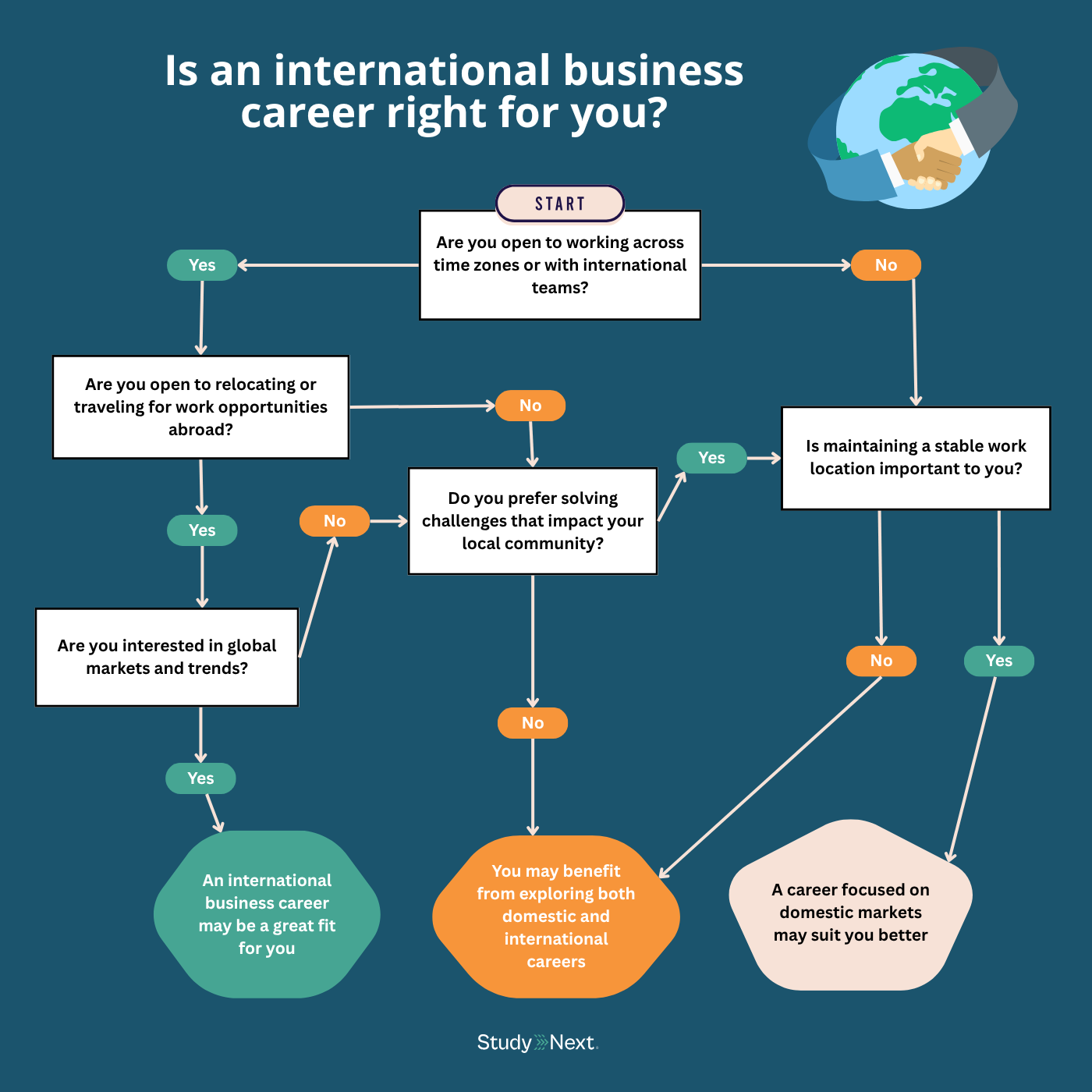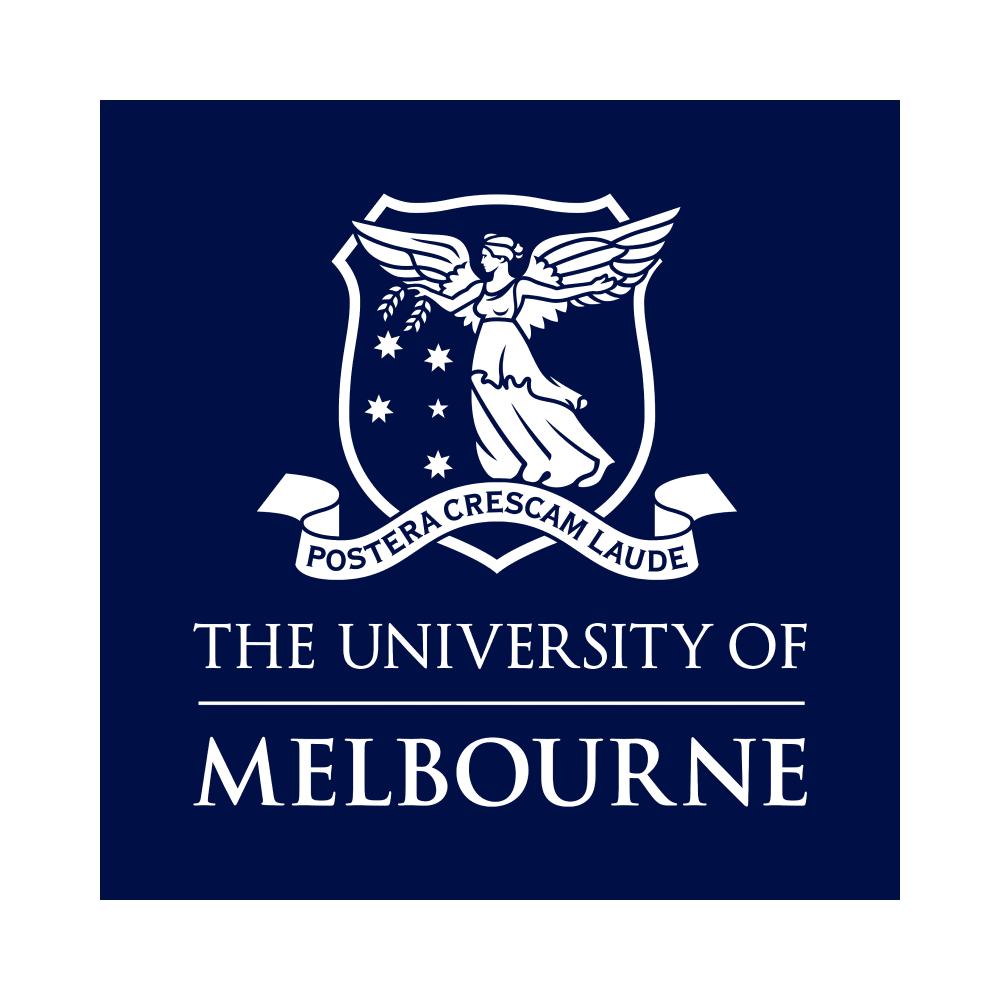In This Article
- How globalisation is reshaping business careers
- Are international business jobs popular in Australia?
- 8 international business jobs you can explore
- Valuable skills for international business?
- Advantages of international business careers
- Is an international business career right for you?
- How postgraduate study can elevate your global career
- Boost your career prospects with a postgraduate international business course

In today’s business landscape, geographic borders are increasingly becoming less of a barrier to business growth. Organisations may choose to expand into international markets, engage in global trade and build diverse teams capable of navigating unique regional challenges. This shift can create diverse opportunities for business professionals to pursue careers that span countries and cultures.
In this article, we explore the rising popularity of international business careers in Australia, along with eight examples of globally oriented business jobs. You’ll discover the potential benefits of pursuing a global role, what skills are considered valuable and how postgraduate study can help elevate your international career prospects. You can also take our quiz to help you determine if pursuing an international job is suitable for you.
How globalisation is reshaping business careers
Emerging trends within globalisation are rapidly reshaping how businesses operate across the world. According to the World Economic Forum (WEF)’s 2025 Future of Jobs report, broadening digital access is expected to be the most transformative force, with 60 per cent of global employers anticipating it will impact their business by 2030. As digital infrastructure expands across regions, businesses can enter foreign markets, reach international customers and work with remote teams.
It’s essential for businesses to build resilience and rethink their strategies to remain competitive in today’s interconnected business world, especially for multinational corporations and companies seeking to expand into new markets. For business professionals, this evolving environment can signal a growing demand for talent with globally relevant skills, which may lead to exciting international business job opportunities for them to explore.
Are international business jobs popular in Australia?
In Australia, international business careers are gaining momentum among professionals and companies. With growing awareness of macroeconomic influences, such as inflation, interest rates and geopolitical conditions, many Australian professionals are reassessing their career paths. Globalization Partners’ 2025 World at Work report found that 62 per cent of Australian executives express concern about losing their jobs due to macroeconomic pressures. In times of uncertainty, professionals may gravitate towards companies with international reach, as they may offer greater stability and resilience to disruption. This is reflected in the study’s global findings, where 46 per cent of employees worldwide believe it’s more important to work in an international company, while 62 per cent of them report they would be willing to relocate abroad in the next year if their employer offered the opportunity to advance their career.
Australian businesses are also embracing global hiring strategies. The WEF report notes that 49 per cent of companies in Australia plan to provide cross-border remote work options, which is double the global average. 63 per cent of them also believe that accessing diverse talent pools is an effective method to address workforce gaps in the country. These figures demonstrate a growing interest in global engagement, suggesting that international business roles are likely to play a significant role in Australia’s evolving job market.
8 international business jobs you can explore
Depending on your field of expertise, professional background and skill set, you can explore a wide range of international roles in the business world, including foreign exchange trader, country manager, global brand ambassador, import and export manager, localisation specialist and international trades specialist. Roles like marketing manager and business development manager may also have international scope, depending on the company and market reach.
Learn more about what these jobs entail and what makes them global below:
Foreign exchange trader
A foreign exchange (forex) trader monitors fluctuations in currency prices to strategically buy and sell currencies for profit. By forecasting the relative value of one currency against another, they can aim to capitalise on shifts in currency demand. This involves interpreting vast amounts of financial data and developing predictive models that can optimise trading outcomes. Given the complexity of the forex market, they must have strong mathematical, analytical and strategic thinking skills.
What makes this job international?
Forex trading is often viewed as international because it involves working with currencies from all over the world. These traders must stay informed about global market trends, such as shifts in interest rates and political developments, as these factors can significantly influence currency values. By assessing these international events, forex traders can make informed predictions about which currencies to buy or sell to generate profit.
Forex traders may operate independently or be employed by financial institutions like brokerages and hedge funds. They may also work in major investment organisations, such as investment banks, multinational corporations, investment management firms or central banks, depending on the scale and nature of their trading activities.
Country manager
A country manager is responsible for managing a company's operations within a specific country or region, driving business success in the local market while ensuring alignment with the broader strategic goals of the global organisation. Their core duties may involve developing and executing plans that promote revenue growth, monitoring company performance and sales metrics to ensure targets are met and providing leadership to various cross-functional teams.
What makes this job international?
Country managers often hold an international role, especially when overseeing business activities in a foreign market. They serve as the primary liaison between headquarters and the local team, converting corporate goals into market-specific actions and ensuring smooth communication across borders. In some cases, this role may require them to relocate to manage local operations. They may be involved in hiring local talent, negotiating with regional partners and navigating international supply chains.
Besides overseeing operations, country managers may be asked to travel to represent the business at events, meetings or conferences. They can be found working across a variety of industries and are typically employed by multinational companies or organisations that are expanding internationally. Their role requires competency in both global business practices and local market dynamics, making them essential to a company’s international expansion and long-term success.
Import and export manager
An import and export manager oversees the international shipment of goods into and out of an organisation. Their primary responsibility is to ensure that products are transported efficiently and in compliance with relevant trade regulations. They often work closely with other departments like sales, marketing and finance to coordinate and streamline import and export procedures. Beyond logistics, import responsibilities often include evaluating supplier capabilities and ensuring the incoming goods reach quality standards. On the other hand, export tasks typically involve developing strategies to enter new markets and ensuring a company’s products meet international demand.
What makes this job international?
This role is generally considered international as it involves navigating the complex nature of global trade and handling the movement of products across borders. Import and export managers are required to have strong knowledge of international trade laws and customs procedures to ensure compliance and mitigate risks. They also have to keep themselves updated on the latest trends in the global economy, currency fluctuations, geopolitical conditions and other international developments that may affect trade activities.
Cultivating a global mindset is essential for this role as it involves frequent engagement with international suppliers and clients. Building strong relationships across cultures enables them to negotiate favourable trade terms and foster long-term partnerships. Import and export managers are commonly employed in industries like manufacturing, supply chain and international trade, where cross-border operations are crucial for business growth.
International trade specialist
An international trade specialist helps organisations make informed strategic decisions by analysing global market conditions to maximise investment outcomes. This typically involves identifying risks and opportunities in foreign markets, assessing global trends and determining the demand for an organisation’s products and services. They also ensure that all trading activities adhere to relevant international trade regulations. Beyond market research and compliance, this professional may negotiate deals with potential overseas partners and draft licensing and agreement contracts to support cross-border transactions.
What makes this job international?
The role of an international trade specialist is typically global in nature, as it focuses on facilitating cross-border trade for companies involved in importing and exporting goods and services. It’s also crucial for this professional to stay informed about the latest international news and developments, particularly changes to international laws and business requirements that could impact trade.
Their expertise helps organisations navigate the complexities of global commerce and capitalise on opportunities in international markets. They can play an important role in helping countries access products and services that may not be available domestically. This position may also involve travelling to other countries for meetings, negotiations or market research. Due to their globally relevant skill set, they are employed across a wide range of sectors, including businesses, non-profit organisations and government agencies.
Marketing manager
A marketing manager supports business growth by planning, developing and executing marketing plans that promote an organisation’s products and services. These campaigns often aim to promote brand awareness, introduce new offerings, generate leads and contribute to increased sales. Some of their core responsibilities typically involve examining consumer data to tailor marketing efforts, managing marketing budgets and measuring campaign performance.
What makes this job international?
For brands with a global presence, reaching international audiences through effective marketing is vital. Marketing managers in these companies are usually responsible for developing marketing plans that can resonate across diverse markets. They need to ensure that the global brand messaging aligns with local market nuances, which may involve adapting campaigns to suit regional languages and customs to ensure cultural sensitivity.
When developing global marketing plans, marketing managers usually analyse foreign markets to identify trends and opportunities. They also need to consider the legal aspects of their campaigns, as different countries typically have their own regulations governing marketing and advertising activities. Since marketing is an important function across industries, global marketing managers can be found working in multinational companies in various sectors like retail and consumer goods, financial services, hospitality and technology.
Business development manager
The main responsibility of a business development manager is to help an organisation achieve long-term growth sustainably. This typically involves identifying new business opportunities in both existing and emerging markets as well as nurturing positive relationships with clients and partners. Their core duties usually include researching industry trends, drafting business partner contracts and proposing new products and services that can appeal to both existing and potential customers.
What makes this job international?
Many companies rely on the expertise of business development managers to identify growth opportunities across borders, demonstrating the global nature of the role. As businesses expand into global markets, these professionals are tasked with researching foreign industries, analysing international competitors and understanding regional consumer behaviour to develop strategies that can connect with their audiences beyond domestic boundaries.
Business development managers within global companies may also interact with international clients and partners. Building and maintaining these relationships typically requires strong cross-cultural communication skills and the ability to negotiate effectively in diverse business environments. They may even travel abroad to attend global industry events, conferences, client meetings or manage international teams. With their global capabilities, these professionals are commonly employed across a wide range of industries within organisations with an international presence.
Account manager
An account manager supports business objectives by building and maintaining professional relationships with specific clients of an organisation. They ensure that clients receive exceptional service and that their needs are fulfilled consistently, fostering long-term relationships that benefit both sides. Some of their usual responsibilities involve collaborating with other departments like sales and marketing to develop customised solutions for clients, providing updates to clients about new company offerings and preparing performance reports for clients and management.
What makes this job international?
Account managers working for organisations with a global presence typically manage client relationships across multiple countries or regions. This usually requires them to have expertise in navigating international market dynamics as well as cultural and regulatory differences. They may also work with cross-border teams across different time zones to tailor solutions for diverse international clients. This job may also require professionals to travel abroad to represent their company at trade shows, industry conferences and networking events. These opportunities can help them build stronger international relationships, stay informed about global trends and identify new business opportunities. Global account managers work in diverse sectors that involve long-term client relationships, such as manufacturing, technology and e-commerce. Their work can play a big role in driving an organisation’s sustainable growth within international markets.
Economist
An economist supports businesses and governments by analysing market trends and economic data to guide investment decisions and shape effective policies. Their work typically involves conducting surveys, gathering macroeconomic data and forecasting economic developments. They may also prepare reports to present their findings for stakeholders, providing insight into various economic matters, such as employment levels, inflation and government spending. This professional’s expertise can help organisations navigate economic challenges and seize opportunities in a constantly evolving market.
What makes this job international?
An economist’s role can become international when their work involves analysing global economic trends to support international policy development and investment strategies. This may include assessing global financial markets, currency exchange rates and broader patterns within globalisation. They must also stay informed on international political developments that can influence economic performance to help them predict future trends.
Depending on their role, they may engage in international policy exchanges and attend global meetings. Their expertise and insights are usually sought after by various organisations like government agencies, insurance firms and financial institutions. By analysing macroeconomic data through a global lens, economists can help influence decisions that impact both domestic and international markets.
Valuable skills for international business
Valuable international business skills often include those that can foster effective relationships across borders, such as cultural intelligence, cross-cultural communication and multilingualism. Soft skills like strategic thinking, adaptability, collaboration and resilience can also enable you to take on global challenges and work in diverse environments. Discover what these skills entail below:
Cultural intelligence: This skill involves acknowledging and respecting different cultural norms and values of the people you work with. Recognising and understanding intercultural differences can help foster a safe work environment, build trust and help you work with diverse teams and global clients in a culturally sensitive manner.
Cross-cultural communication: Clear communication is essential to manage international relationships with colleagues, partners and other internal and external stakeholders. This can involve navigating language or cultural gaps and interpreting non-verbal cues for smoother collaboration. By communicating effectively, you can reduce misunderstandings, strengthen teamwork and improve client relationships.
Multilingualism: While it’s not mandatory in every international role, proficiency in one or more languages can greatly boost your career prospects in specific markets. It allows you to connect authentically with clients and customers speaking in those languages, which may lead to deeper engagement and more seamless communication.
Strategic thinking: International careers often involve complex challenges that require strategic planning and analysis. This skill helps you evaluate global trends, examine risks, make informed decisions across different markets and align local actions with broader global goals of your organisation.
Adaptability: Working in a global job may involve managing changing environments, regulations or cultural nuances in foreign markets. Being adaptable is important as it helps you adjust quickly in response to these changes, remain productive and find creative ways to accomplish goals effectively.
Collaboration: This skill is vital when you work with teams across borders, time zones and cultures. By practising strong collaboration skills, you can share knowledge, build rapport and work towards shared goals with diverse colleagues efficiently.
Resilience: International careers often come with unique challenges, including the need to adapt to different cultural environments or even relocating to a different country. Remaining resilient can help you navigate global environments and stay motivated in times of uncertainty, which is essential for long-term career success.
Advantages of international business careers
International business careers can offer a wide range of benefits for both employees and employers. For employees, these jobs can provide exposure to a diverse work environment, enhance career prospects, offer global networking opportunities and support broader skill development. For employers, adopting global hiring strategies can provide access to a wider talent pool and support business expansion into international markets. Learn more below:
Diverse work environment
Working in a globally oriented role means engaging with people from diverse cultural and social backgrounds. You can be exposed to various types of communication styles and work habits. Being in this type of work environment can help you become more inclusive, open-minded and understanding of different ideas and perspectives. This can also foster a culture of collaboration and innovation, leading to better team cohesion and work productivity.
Enhanced career prospects
Gaining international experience can help you expand your professional reach and pursue career opportunities in other countries. It demonstrates a global mindset and the ability to navigate diverse business landscapes, which are qualities that are highly valued by employers. This versatility may give you a competitive edge in today’s global job market.
Global networking opportunities
In an international job, you’ll likely build professional relationships with colleagues and stakeholders from around the world. Networking can open doors to potential collaborations, new career opportunities and valuable global industry insights. Expanding your circle beyond local borders can also enhance your visibility in your field. When you’re connected with professionals across different countries, your work and expertise may be recognised and valued on a global scale.
Broader skill development
Working in an international role can help you develop global skills like cross-cultural communication and cultural sensitivity. Exposure to different markets and their challenges can also improve your skills in strategic thinking and problem-solving. These skills are often considered important for thriving in diverse industries in the business world.
Diverse talent pool
Employers can look beyond local candidates to find the right talent to fill specific roles they’re looking to fill. When geographic location is no longer a barrier, they can work towards building a diverse and skilled workforce, which can foster innovation and help them get ahead in the business landscape. Prioritising inclusivity and global collaboration can also improve their brand reputation, which may attract top-tier talent from around the world.
Market expansion
Global professionals can play an important role in supporting companies with an international presence or those looking to enter foreign markets. Their local insights can help businesses customise their products, services and marketing efforts effectively. Hiring professionals with international experience can help companies achieve smoother cross-border operations.
Is an international business career right for you?
An international business career may align well with your professional goals and personal preferences. Take the quiz below to discover whether pursuing a global role is the right step for you.

How postgraduate study can elevate your global career
Pursuing postgraduate study can be a strategic move to build the skills and expertise you need to support your international career ambitions. Many universities in Australia offer postgraduate international business courses designed to help you cultivate a global mindset, enabling you to work with international teams and navigate global markets. Depending on your career ambitions and learning goals, you can choose the right entry point for your postgraduate journey in this field, whether it’s a graduate certificate, a graduate diploma or a master’s degree.
Below are several courses you can consider:
Graduate Certificate in Business (International Business)
This course at the Queensland University of Technology (QUT) is well-suited for individuals seeking to deepen their knowledge of international business. During your studies, you’ll examine the global landscape through key disciplines like accounting, logistics, marketing and management. You can also develop your cultural intelligence and leadership capabilities through this program, helping you navigate culturally diverse situations effectively. The units in this course include Developing Cultural Intelligence, Developing Entrepreneurial Mindsets, Managing in a Globalised Economy and Business Intelligence.


This program is ideal for individuals seeking a deeper understanding of the complexities of international business. As part of this program, you’ll explore the international business environment across various disciplines, such as accounting, finance, logistics, management and marketing.
In today's highly globalised business environment, workplaces are more diverse than ever, making it crucial for business leaders to adapt to new cultural settings and work effectively with others. To build your cultural intelligence and enhance your leadership skills, you’ll engage with theoretical frameworks to understand key aspects of cultural intelligence, enabling you to interpret differences in cultural behaviour. Simultaneously, you'll develop practical skills to respond appropriately and effectively in culturally diverse situations.
Moreover, you’ll examine the approaches and technologies enterprises use to investigate business issues and develop insights that guide effective business strategy. Through hands-on application of key theories and business research tools, you'll gain skills in collecting and analysing data about the business environment as well as its internal processes and generate insights to help businesses create value through innovation, product development and process improvement.
Graduate Certificate in International Business
This RMIT University program can help you prepare for an international career across public, private or non-profit sectors. This course offers great depth in contemporary practices in cross-cultural management, international business and leadership, with units including Global Business Environment, Managing Cross-border e-Commerce in the Digital Era, Managing Across Cultures and Global Entrepreneurship. Through this program, you can develop the right skills to make sustainable and ethical decisions in today’s business environment.


The Graduate Certificate in International Business is a great preparation for your global career goals in private, public or not-for-profit organisations covering contemporary practices in cross-cultural management, international business and leadership.
Through your study in this course, you will gain a thorough understanding of contemporary international business theory and build the necessary skills to make ethical and sustainable business decisions. You'll have the context and capacity to address and evaluate the impacts of these decisions and provide benefit to your workplace.
Graduate Diploma of International Business
In this course at La Trobe University, you can advance your business knowledge in diverse core fields like finance, business analytics, economics and logistics, while learning how multinational companies operate. Some of the global topics covered include cross-border negotiations, international transport and logistics, cross-cultural marketing and global financial management. If you have plans to further your postgraduate study, you may transfer into the second year of the Master of International Business after completing this course.


La Trobe's Graduate Diploma in International Business is the perfect way to advance your knowledge in just one year. Gain strong and current business knowledge, including business analytics, finance, economics, accounting and logistics. You'll then progress to build a strong understanding of the effective management of multinational firms, exploring how they operate – including the intricacies of cross-cultural marketing, global financial management, cross-border negotiations and international transport and logistics.
After completing the Graduate Diploma in International Business, you could transfer directly into the second year of the Master of International Business, should you decide to continue with your studies.
Graduate Diploma of International Business
This graduate diploma at CQUniversity is designed for aspiring managers seeking to work in multinational organisations. The units in this course cover both core management and international management functions, from business communications and human resource management to governance and business law, international financial management and global marketing. Delivered fully online and available in part-time mode, this program is ideal for working professionals seeking flexibility to balance career and study commitments. Recorded lectures are also available for viewing at your convenience.


You can ensure you understand and apply the best management practices and business knowledge to improve organisational effectiveness from a strategic and cross-cultural perspective. The Graduate Diploma of International Business provides you with the skills and knowledge needed to pursue a successful career as a manager within multinational corporations.
Designed for busy professionals who enjoy the flexibility to study part-time and online. You can also access recorded lectures at a time that works best for you.
Upon completion of the first four units, you will be eligible to satisfy the interim or exit award of the Graduate Certificate of Management. After completing this course, you can proceed to the Master of Business Management with credit for eight units.
When you study this master’s degree at Monash University, you can gain a deep understanding of how the global business landscape impacts businesses, strategy, trade, sustainability, intercultural communication and more. This course includes experiential learning opportunities that aim to enhance your master’s experience, including international study tours and corporate projects. You can also customise your degree by taking elective units in areas like data analytics, supply chain management, diplomacy and international relations, management and foreign languages.


The more we move into the future, the more intertwined the international business landscape becomes. Driving positive and sustainable progress for organisations and people alike takes a deeper understanding of the economic, political and social forces at play in the world of business – as well as a clearer perspective on how to use your insights and experience to respond to these forces.
This multidisciplinary master's program builds your awareness of the global business environment, while progressing your practical expertise as well.
In as little as one year, you’ll have developed a greater awareness for the global context – and how this context impacts business, strategy, government, diplomacy, trade, sustainability, social responsibility, intercultural communication and more.
Complementing this deeper understanding of cross-regional, cross-cultural challenges and opportunities is an altogether stronger business skillset. The program elevates your ability to think critically, solve innovatively and impact sustainably. So by the time you’ve completed your study, you’ll be ready to find practical ways forward to complement your understanding.
Flexibility is a key component of the program – and you can choose to hone in your focus on specific areas of study, or take part in a broader set of electives. Whichever path you choose, one thing’s certain. You’ll have equipped yourself with the knowledge – and practical know-how – to influence positive change to the world of business in a global scale. While taking your career in exciting new directions too.
Master of International Business
This master’s course at the University of Melbourne can be ideal for individuals looking to pursue a management career in international business and those wanting to hone their understanding of global trade and investment policies, particularly in the Asia-Pacific region. As a student, you’ll have access to various global learning opportunities, including exchange programs with over 200 university partners, the chance to complete an intensive subject abroad or pursue a dual degree in Montreal or Milan. The institution also provides practical industry experiences, such as internships and consulting projects, that allow you to tackle real business challenges in Melbourne, Kuala Lumpur, Shanghai or London.


The Melbourne Business School's Master of International Business will equip you with effective management skills for the international business sector.
Your knowledge and understanding will be developed through in-depth learning in areas such as strategic management, corporate governance in a global context, cross-cultural impacts and marketing in an international space.
This program is for graduates who wish to establish a management career in international business, and who aim to develop a sound understanding of the policies governing the world trade and investment system, with a particular focus on the Asia-Pacific region.
Boost your career prospects with a postgraduate international business course
In today’s globally connected landscape, career opportunities can extend beyond national borders, offering you the chance to work across diverse markets. Pursuing postgraduate study in international business can be a great way to help elevate your prospects of securing an international role. These programs can help you develop the essential skills, insights and practical experience needed to succeed in global business environments. Kickstart your journey and explore various postgraduate international business courses offered by top Australian universities.























